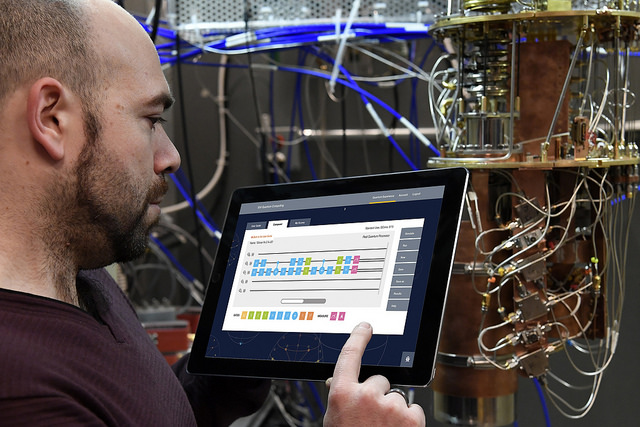IBM made the bold claim this week that it had made quantum computing available to the public as a cloud-based on-demand service for use in quantum processing experiments.
Dubbed the ‘IBM Quantum Experience’, the platform essentially gives users access through their computer to IBM’s quantum processor located at IBM’s Watson Research Center in New York.
“For the first time ever, IBM is making quantum computing available via the cloud to anyone interested in hands-on access to an IBM quantum processor,” the company boasted.
Quantum Computing
 “This is the beginning of the quantum age of computing and the latest advance from IBM towards building a universal quantum computer.
“This is the beginning of the quantum age of computing and the latest advance from IBM towards building a universal quantum computer.
“A universal quantum computer, once built, will represent one of the greatest milestones in the history of information technology and has the potential to solve certain problems we couldn’t solve, and will never be able to solve, with today’s classical computers.”
Sounds monumental. The only problem I found? I haven’t the slightest morsel of knowledge about quantum computing, and how it could help the everyday member of the public improve their life.
After all, IBM led with the fact that quantum computing is now open and free to “members of the public”, so how can I make use of it?
Qubits
Quantum computing is no doubt the future of computing and works very different differently from the way today’s computers do.
A standard computer makes use of bits to process information, where each bit represents either a one or a zero. In contrast, a quantum computers bit, known as a qubit, can represent a one, a zero, or both at once, which is called superposition. This property, along with other quantum effects, let quantum computers perform certain calculations faster than is possible with today’s normal computers.
IBM argues that most of today’s quantum computing research in academia and industry is focused on building a universal quantum computer. The major challenges include creating qubits of high quality and packaging them together in a scalable way, so they can perform complex calculations in a controllable way.
However, a universal quantum computer does not exist. Still, IBM envisions medium-sized quantum processors of 50-100 qubits to be possible in the next decade, and its quantum project is the first step in that.
“With a quantum computer built of just 50 qubits, none of today’s TOP500 supercomputers could successfully emulate it, reflecting the tremendous potential of this technology,” IBM said.
Why?
I asked IBM about the practical applications of its quantum experience. A spokesperson said that as IBM believes quantum computing is the future of computing, giving access away in this manner will help speed up innovation.
“By giving hands-on access to IBM’s experimental quantum systems, the IBM Quantum Experience will make it easier for researchers and the scientific community to accelerate innovations in the quantum field, and help discover new applications for this technology,” they said.
“If you think back to the 1970s and 1980s when young computer enthusiasts had access to mainframe computers. This is exactly the same idea — give people the tools so they can begin to innovate.”

Still, by the way most technology news sites reported the story, I’d assume I’d be up and running with quantum computing by the end of the week.
Yesterday I signed up to gain access to the service, and by this morning I was online.
IBM has provided a decent amount of documentation to help new users get started with quantum computing, but I was still at a loss as to what I should actually be doing. I asked IBM how and where its quantum project will be used, and the answer I got made me realise that this kind of thing just isn’t for the faint of heart.
“It can execute small quantum algorithms that show uniquely quantum properties, like superposition and entanglement, as well as performing small quantum algorithms such as Grover’s algorithm and Deutsch-Jozsa,” replied IBM. “Grover’s algorithm is a search algorithm that would be useful in searching unstructured databases.”
But IBM said despite everyone being able to access the platform, it’s really intended for theorists or scientists to eventually advance the cause of quantum computing.
“Many quantum information theorists or scientists do not have access to actual hardware to test their ideas. By offering cloud-enabled access to IBM’s advanced experimental quantum systems, it can open up new applications for quantum computing,” the spokesperson added.
Looks like I need to start my homework.
Take our London technology quiz here!





